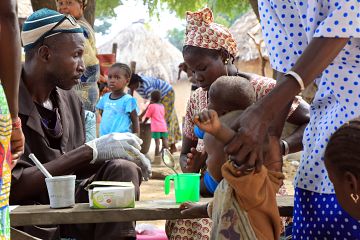Flexibility and adaptation key to maintaining SMC coverage in Nigeria’s conflict-affected Borno state
15 May 2023
Learning from adaptations to seasonal malaria chemoprevention (SMC) campaigns in Nigeria highlights how the intervention remained highly effective in conflict-affected areas, ensuring preventive treatment for over two million children under five in Borno state.
Malaria threatens the lives of nearly half the world’s population. In Nigeria, malaria is highly endemic with incidence and mortality rates the highest of any country in the world. Borno is the second largest state in Nigeria and during the peak malaria transmission season from July to October, malaria is one of the main drivers of illness and death among children under five, accounting for more than 50 percent of mortality and 50 percent of all recorded morbidity in the state.
SMC – recommended by the World Health Organization (WHO) in 2012 – involves the administration of monthly treatment courses of antimalarial medicines to children 3–59 months during the peak transmission season. The objective is to prevent malaria infections in young children, who are particularly vulnerable to the disease, during this high-risk period.
2021 was the first year in which Malaria Consortium supported the Borno State Malaria Programme to implement SMC. Despite a funding gap that threatened to leave the state without SMC at short notice, the NMEP requested additional financial and operational support via the SMC Alliance, the global platform for SMC-implementing governments, implementing partners, bilateral organisations and donors. In response to this request, Malaria Consortium allocated philanthropic funds at short notice to enable the SMC campaign to go ahead. However, even with the funding issue resolved, the ongoing conflict in the region, and resulting displacement of individuals, made it incredibly challenging to reach all eligible children with SMC. The lives of communities in Borno state continue to be affected by a ten-year-old religious conflict that has resulted in 1.5 million internally displaced people (IDP).
“A flexible and collaborative approach between Malaria Consortium, Nigeria’s National Malaria Elimination Programme, Borno’s State Malaria Elimination programme and several other organisations operating in the area meant that the deployment of SMC was completed successfully and on time. We worked quickly and collaboratively to organise the SMC campaign in the state, including some adaptations to the campaign methods we use elsewhere in Nigeria. We modified our classification of households to include tents in IDP camps. Consequently, we were able to conduct door-to-door campaigns in almost all low to high-risk security areas to reach local communities and IDPs”, said Chibuzo Oguoma, Malaria Consortium’s SMC Programme Director in Nigeria.
Using adaptive and flexible approaches successfully mitigated evolving logistical challenges in the conflict areas. This meant the delivery of medicines and other SMC commodities to hard-to-reach locations and the operation in areas with security risks could continue.
The SMC campaign teams collaborated with the state polio campaign which provided lists of communities, IDP camps and a database of children under five that was disaggregated by community, as well as data on registered trained personnel who could be mobilised at short notice. To travel within the region and distribute SMC commodities, the implementers also used military escorts and helicopter services to enhance security for people involved in the distribution of SMC medicines.
To adapt to security situations, the implementing partners made use of already established systems, community structures and partnerships which are difficult to establish in volatile situations. This included collaboration with the National Malaria Elimination Programme, Borno state authorities and existing health services with an established presence in hard-to-reach locations at the community level.
Borno state has a population of over six million people and the SMC campaign reported reaching more children than the original estimate of eligible children (approximately 2,050,000) across the state with four monthly SMC cycles. SMC coverage measured through routine household surveys following each monthly SMC cycle ranged from 93 to 96 percent.
Overall, less than one percent of the rollout required special approaches, such as temporary fixed distribution points, to reach displaced eligible children. Only one local government area of Borno – a subdivision of the state administered by a local government council – was inaccessible to the SMC campaign due to security concerns.
Malaria Consortiums’ partners for the Borno SMC campaign included the state Ministry of Health, the State Malaria Elimination Programme, the National Malaria Elimination Programme, World Health Organization, United Nations Humanitarian Air Services, Médecins Sans Frontières, and InterSoS.
Read more about this work in our learning brief: Implementing seasonal malaria chemoprevention in conflict-affected areas in Borno state
Related content
29 March 2023
Implementing seasonal malaria chemoprevention in conflict-affected areas in Borno state
Latest news
- Malaria Consortium honoured by Ugandan government for contribution to combat malaria23rd April 2024
- International summit calls for AMR accountability in public health interventions21st March 2024
- Global SMC community celebrates new milestone at SMC Alliance Annual Meeting in Nigeria6th March 2024
- Scaling up key interventions could halve pneumonia-related childhood mortality13th February 2024
- Malaria Consortium and eGov Foundation join Mozambique’s national malaria programme to digitalise seasonal malaria chemoprevention campaigns8th February 2024
- World’s first malaria vaccine rollout launched in Cameroon22nd January 2024